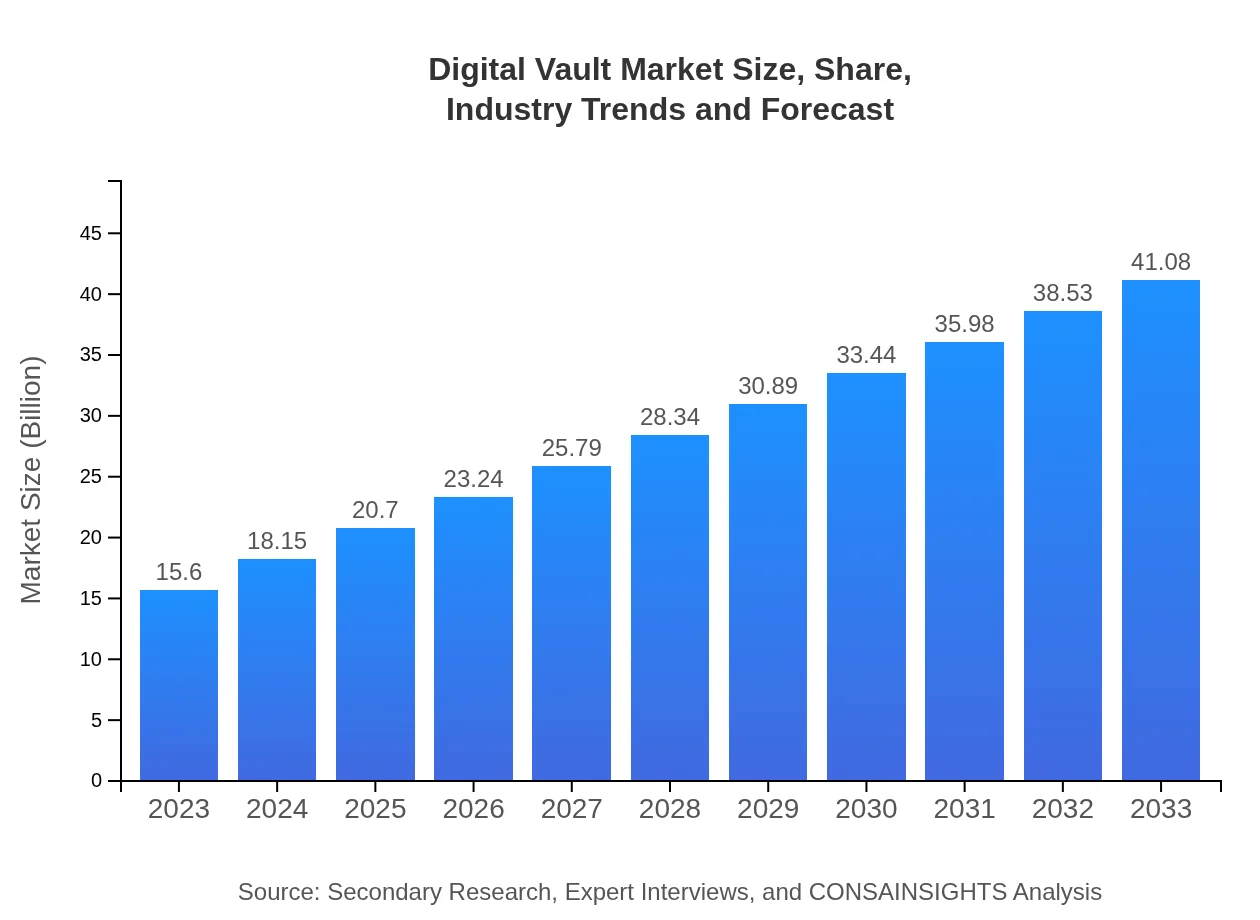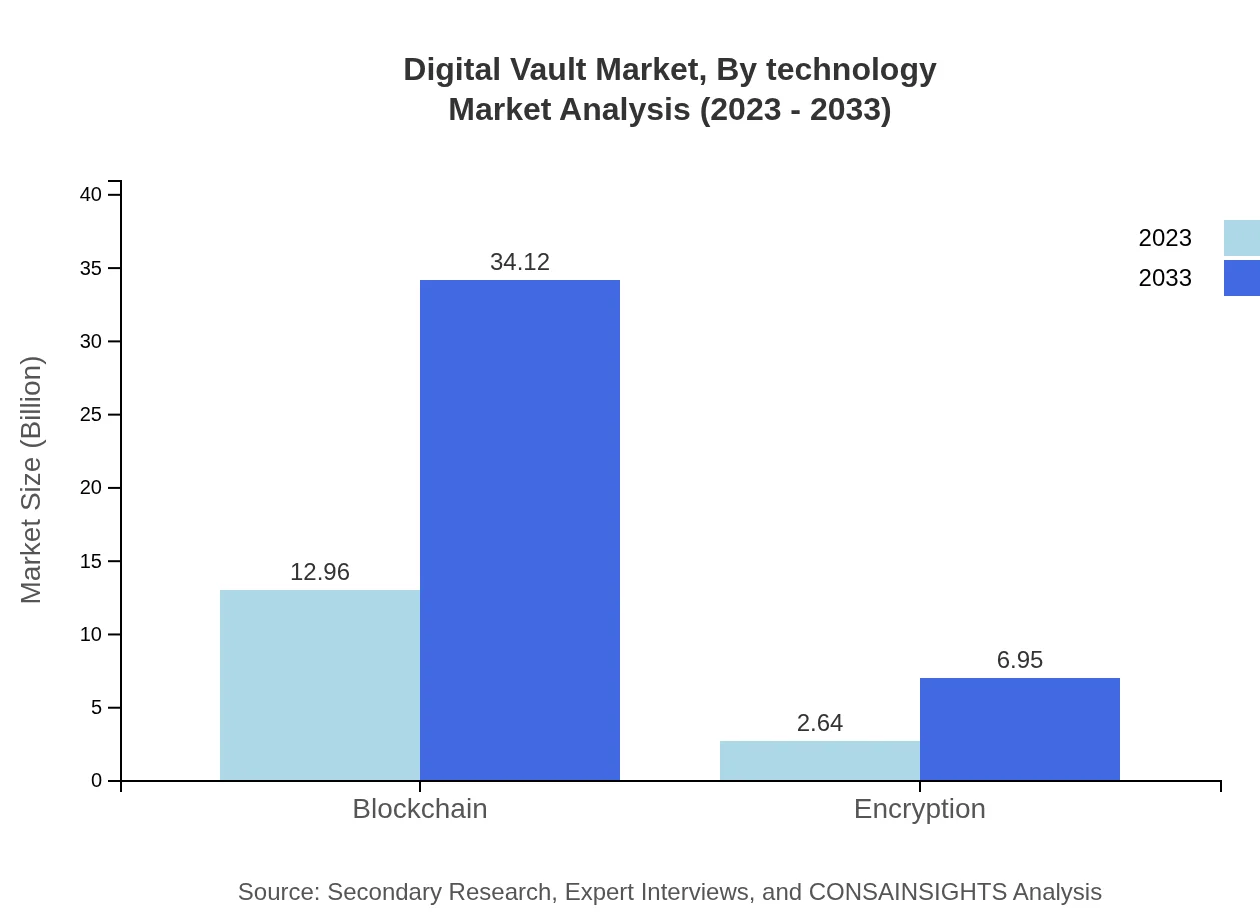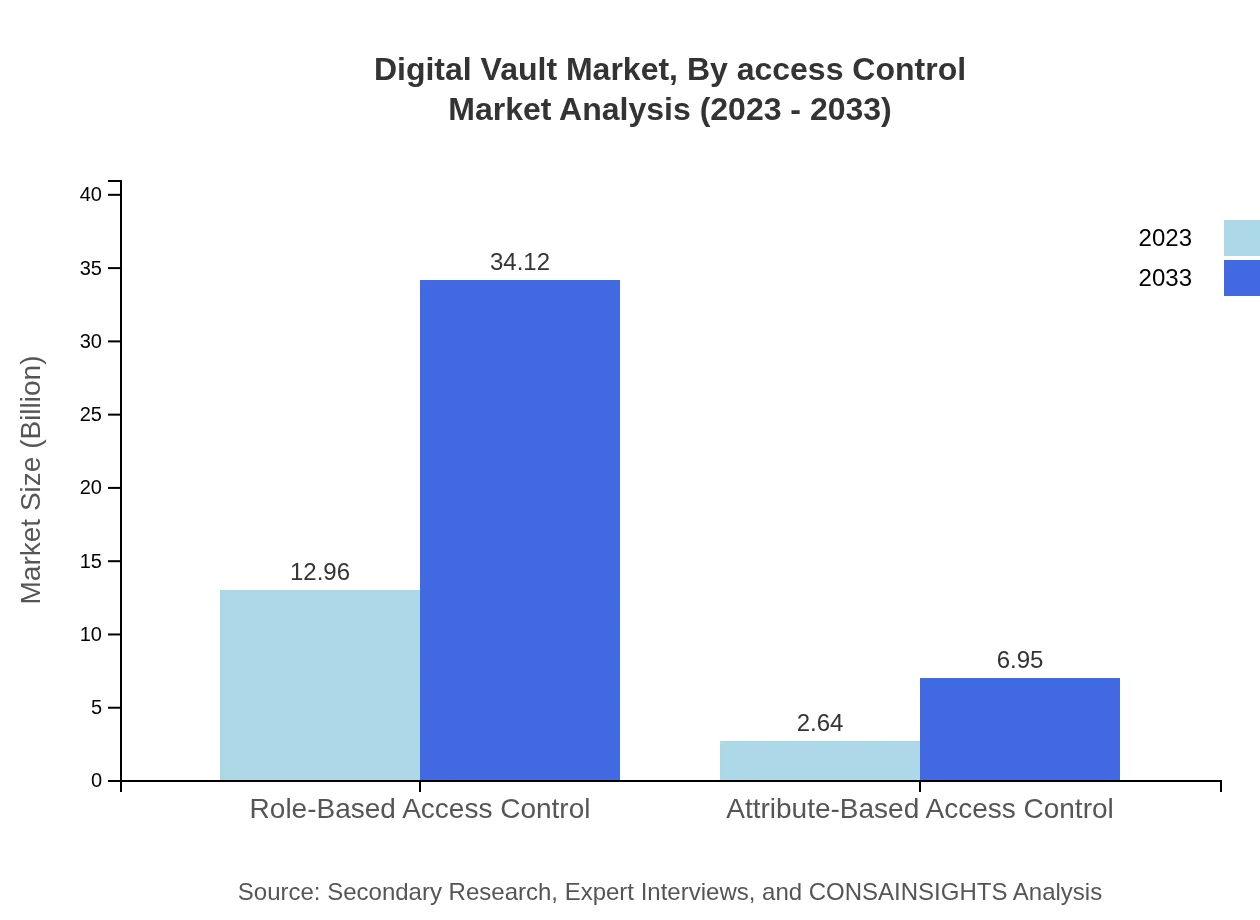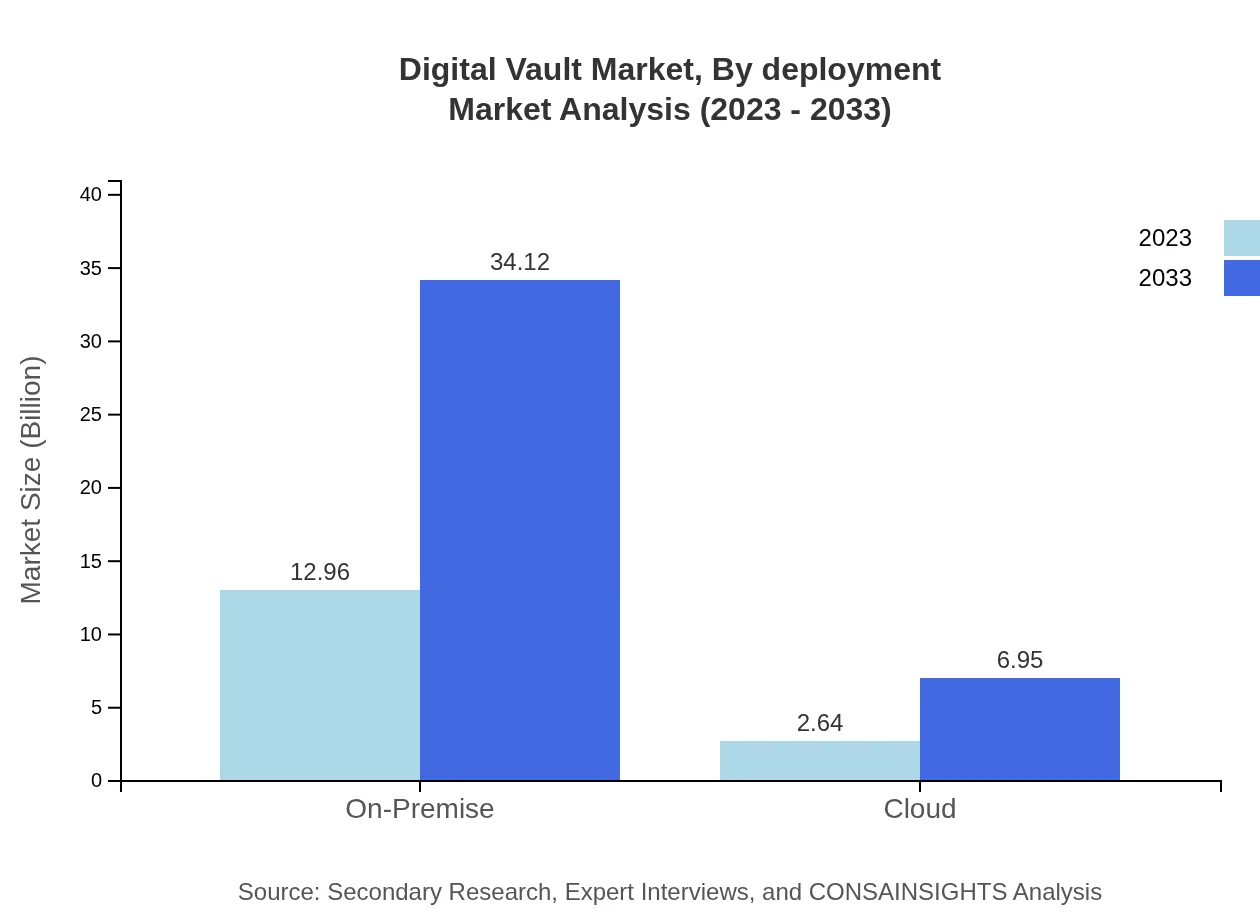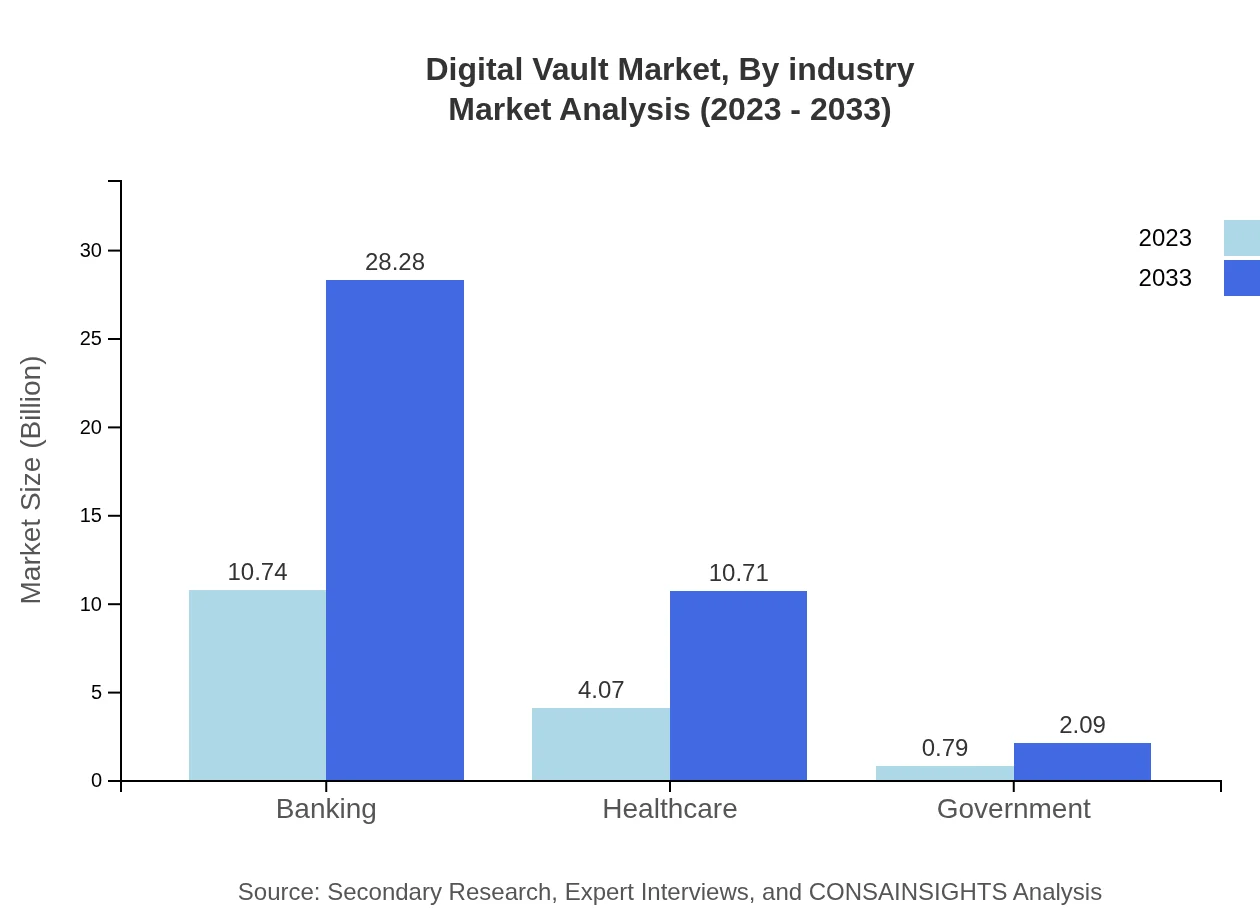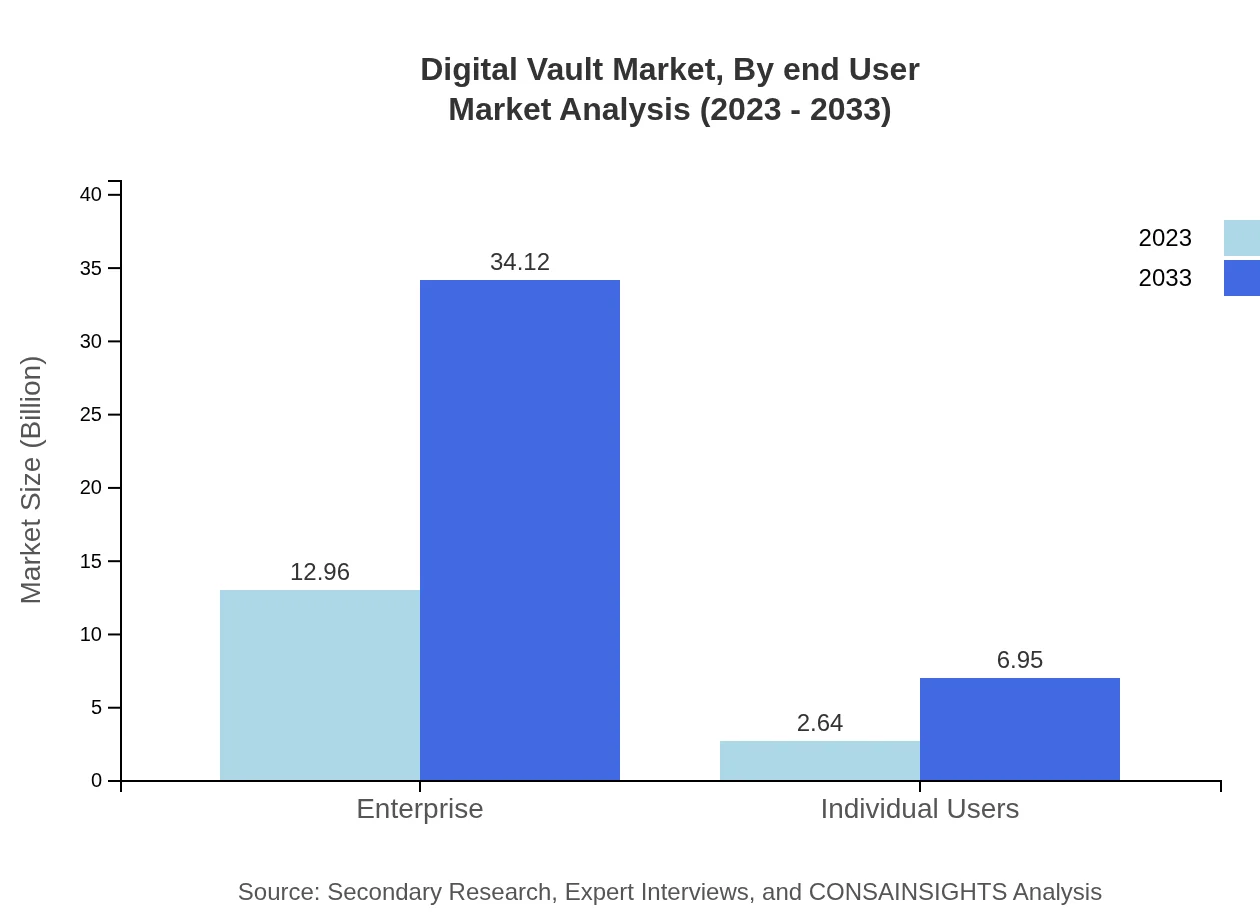Digital Vault Market Report
Published Date: 31 January 2026 | Report Code: digital-vault
Digital Vault Market Size, Share, Industry Trends and Forecast to 2033
This report provides a comprehensive overview of the Digital Vault market, covering key insights, trends, and forecasts from 2023 to 2033. It addresses market size, CAGR, regional analysis, industry segmentation, and key players, presenting valuable data for stakeholders in the digital security landscape.
| Metric | Value |
|---|---|
| Study Period | 2023 - 2033 |
| 2023 Market Size | $15.60 Billion |
| CAGR (2023-2033) | 9.8% |
| 2033 Market Size | $41.08 Billion |
| Top Companies | IBM Security, Thales Group, DigiVault, Oracle Corporation, Tenable |
| Last Modified Date | 31 January 2026 |
Digital Vault Market Overview
Customize Digital Vault Market Report market research report
- ✔ Get in-depth analysis of Digital Vault market size, growth, and forecasts.
- ✔ Understand Digital Vault's regional dynamics and industry-specific trends.
- ✔ Identify potential applications, end-user demand, and growth segments in Digital Vault
What is the Market Size & CAGR of Digital Vault market in 2023?
Digital Vault Industry Analysis
Digital Vault Market Segmentation and Scope
Tell us your focus area and get a customized research report.
Digital Vault Market Analysis Report by Region
Europe Digital Vault Market Report:
In Europe, the market starts at $5.16 billion in 2023, on track to reach $13.58 billion by 2033. Enhanced focus on data protection regulations, such as GDPR, is compelling enterprises to invest in digital vault technologies to ensure compliance and secure sensitive information.Asia Pacific Digital Vault Market Report:
In the Asia Pacific region, the digital vault market is valued at approximately $2.95 billion in 2023 and is projected to grow to $7.78 billion by 2033. This growth is driven by increased digitization, heightened awareness of cybersecurity threats, and rising adoption of cloud services across various industries.North America Digital Vault Market Report:
North America, a leader in digital vault adoption, sees its market valued at $5.19 billion in 2023, expected to grow to $13.68 billion by 2033. The region benefits from a mature technological infrastructure, R&D investments, and stringent regulatory frameworks mandating data protection.South America Digital Vault Market Report:
The South American market shows significant potential, starting at $1.11 billion in 2023 and reaching approximately $2.91 billion by 2033. The demand for digital vault solutions is accelerating as businesses recognize the need for enhanced data protection amid growing digitalization and cyber risks.Middle East & Africa Digital Vault Market Report:
The Middle East and Africa market, beginning at $1.19 billion in 2023, is anticipated to grow to $3.13 billion by 2033. Growing concerns over data breaches and an increasing shift towards digital services are driving investments in digital vault solutions within this region.Tell us your focus area and get a customized research report.
Digital Vault Market Analysis By Technology
The technology segment highlights the different methods employed in digital vault systems, such as blockchain and encryption technologies. By 2033, blockchain technology is expected to dominate, generating significant market value, as organizations seek to leverage its inherent security and transparency features.
Digital Vault Market Analysis By Access Control
Access control methods, including role-based access control (RBAC) and attribute-based access control (ABAC), are critical for ensuring only authorized users can access sensitive data. RBAC is projected to maintain a significant share of the market as organizations opt for managing user rights effectively based on their roles.
Digital Vault Market Analysis By Deployment
The deployment segment differentiates between cloud-based and on-premises solutions. While on-premises systems currently account for a larger share of the market, the cloud deployment model is rapidly gaining ground due to its flexibility, scalability, and cost-effectiveness.
Digital Vault Market Analysis By Industry
The industry segment shows varied usage of digital vaults across sectors with banking and healthcare leading the demand due to stringent regulations on data handling. Enterprises are increasingly investing in digital vaults to comply with industry standards and protect sensitive information.
Digital Vault Market Analysis By End User
End-user segmentation reveals a strong preference among enterprise users, who are the largest consumers of digital vault solutions. Individual users are also increasingly recognizing the value of these services for personal data protection, contributing to market diversification.
Digital Vault Market Trends and Future Forecast
Tell us your focus area and get a customized research report.
Global Market Leaders and Top Companies in Digital Vault Industry
IBM Security:
IBM Security offers advanced digital vault solutions combining strong encryption methods and sophisticated access control technologies, catering to both enterprises and individual users.Thales Group:
Thales Group provides comprehensive data protection solutions, including digital vault services, focusing on regulatory compliance and enhanced data security for organizations worldwide.DigiVault:
DigiVault focuses on secure digital vault services specifically designed for financial and compliance sectors, ensuring audit trails and data integrity.Oracle Corporation:
Oracle Corporation's digital vault offerings prioritize enterprise security, providing solutions that integrate seamlessly with larger database platforms to safeguard sensitive information.Tenable:
Tenable specializes in cybersecurity solutions, including digital vault services, focusing on vulnerability assessment and risk management for various industries.We're grateful to work with incredible clients.









FAQs
What is the market size of digital vault?
The digital vault market is projected to reach approximately $15.6 billion by 2033, growing at a robust CAGR of 9.8%. This growth reflects a strong demand for secure data storage solutions across various sectors.
What are the key market players or companies in this digital vault industry?
Key players in the digital vault industry include major technology and security firms. Their innovations drive market dynamics and contribute to competitive landscapes. Collaboration and strategic alliances further enhance their position in this rapidly evolving sector.
What are the primary factors driving the growth in the digital vault industry?
Growth in the digital vault industry is primarily driven by increased data security concerns, regulatory compliance requirements, and the rising demand for secure online transactions. Businesses are investing more in robust digital solutions to protect sensitive information.
Which region is the fastest Growing in the digital vault?
Asia Pacific is the fastest-growing region for digital vault solutions, with market growth projected from $2.95 billion in 2023 to $7.78 billion by 2033. This region experiences an increasing need for data security among businesses.
Does ConsaInsights provide customized market report data for the digital vault industry?
Yes, ConsaInsights offers customized market report data tailored to specific needs in the digital vault industry. This ensures that clients receive relevant insights focused on their unique business growth goals and market conditions.
What deliverables can I expect from this digital vault market research project?
From the digital vault market research project, expect comprehensive reports, data analysis, and market forecasts. Deliverables include insights into market trends, competitive landscapes, and strategic recommendations for market entry or expansion.
What are the market trends of digital vault?
Current market trends in the digital vault industry include a shift towards cloud solutions, increased adoption of blockchain-based security, and the integration of advanced encryption methods. These trends are reshaping the digital security landscape, enhancing data protection.

